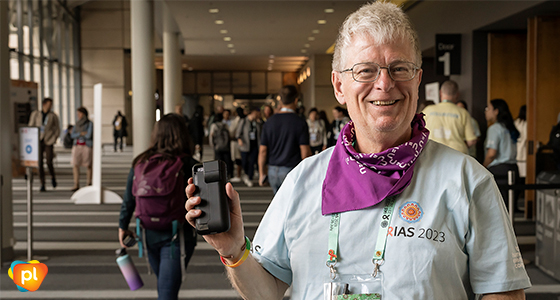Melbourne International AIDS conference, July 2014: I was about to head out the door of my hotel when I stopped to look at the TV screen in the lobby.
I was stunned to see what appeared to be wreckage of a large aircraft strewn all over fields of sunflowers. The reporter was saying that a commercial airliner had been shot down somewhere over Ukraine! It was flight MH17 from Amsterdam.
I was on my way to a pre-conference meeting as part of the International AIDS Conference (AIDS 2014). I was to volunteer at the conference for the first time. Little did I know the significance of this disaster for that conference. Amongst those who were killed that day were some of the most respected researchers, scientists, and clinicians in the world of HIV/AIDS medicine. I have never forgotten that morning.
I was reflecting on that memory in Brisbane recently as I was about to volunteer at the International AIDS Conference 2023 (the 12th IAS Conference on HIV Science). The International AIDS Society (IAS) is based in Geneva and organises global meetings each year. These meetings alternate between this HIV Science conference and the larger, broader International AIDS conferences (which attracts a substantial number of community-based organisations and attendees and includes a Global Village ‘expo’ which is open to the public as well as conference delegates).
Since Melbourne, I have volunteered at four other IAS conferences (Vancouver, Paris, Amsterdam and now Brisbane). This unpaid ‘work’ has provided some of the most rewarding and stimulating times of my life. As volunteers must make their own way to the conference location and pay for all living/ travel costs, there is a depth of commitment and dedication which is impressive. Luckily, I have managed to turn these assignments into holidays to travel to places I might not ever go. (In Brisbane, I also got to see the Matildas play one of their World Cup matches!)
It was entirely appropriate that in the Opening Ceremony for IAS 2023, there was an emotional memorial to those killed in 2014. A stunning piece of music was played on stage as we all thought back to that time and the huge loss we felt for all the lives cut short and the potential future contribution to HIV/AIDS medicine and research that was also lost that day.
The Brisbane conference lasted four days and I was able to attend sessions when not on a work shift. I never fail to be amazed by the skill, commitment and determination of those who work in the field and come along to present their research/ clinical findings. Some of the detail is mind numbing in its complexity and reminds me why, in the 42 years since the start of the HIV/AIDS pandemic, we still have not yet found a cure/ preventative vaccine or viral eradication strategy.
However, we have made enormous strides in treatment and reducing the death rate for people living with HIV (although access to life saving medication/treatment is woefully inequitable across the world). The reason I could attend the Brisbane conference was because I did have access to life-saving treatment in Australia.
I have often felt a ‘time traveller’ at these IAS Conferences, never expecting to be still alive to attend them! I was a classic ‘late presenter’ in June 1995, with near life-ending pneumonia and barely a handful of CD4 cells. I skipped the testing HIV positive step and went straight onto a ‘full-blown’ AIDS diagnosis (as it was often termed in those days). However, my life was saved in hospital, I commenced AZT monotherapy and a host of other medicines to ward off several nasties (like going blind). Prognosis: I could expect to live another 2 or 3 years if I was fortunate.
Having lost so many of my contemporaries over the intervening years, I now find myself a long-term survivor or a ‘HIV/AIDS Elder’, if you like. Perhaps you can now understand my sense of being a time traveller at HIV/AIDS conferences? Much of the latest HIV research continues to add to our knowledge of how to combat this most tricky of viruses, even if we can’t yet completely defeat the bastard!
For example, a major announcement was made at Brisbane demonstrating the potential benefit of adding a statin to the medication regime of people living with HIV (PLHIV). Whilst all medication decisions are the right of individual PLHIV to make, hopefully in close consultation/ dialogue with their treating medical staff, this existing class of medication could usefully reduce the incidence of cardiovascular disease. It was suggested that this could also benefit those who would usually be considered at low risk of developing cardiovascular disease.
Other conference presentations dealt with long-acting injectable medication options and updates on work to develop vaccines and potential eradication approaches. However, much more work still needs to be done.
I feel so privileged to hear about this work first hand, knowing that the ‘one pill a day’ regime I am on today (unimaginable in the 1990s) is a direct result of such dedicated researchers and clinicians. I can still well remember taking 18 capsules a day of Saquinavir – just ONE of the several drugs in my ARV cocktail.
Most likely I will not live to see the ‘end of HIV’ – in the sense that we will truly cure, eradicate and prevent infection with HIV. However, I feel so fortunate to have been alive these past 28 years – largely thanks to the tireless efforts of those medical/ research/ clinical professionals who attend IAS conferences.
POSTCRIPT
The next International AIDS Conference (AIDS 2024) will be held in Munich, Germany next July 2024.
– Adrian Eisler
Published in Talkabout Online #207 – December 2023







